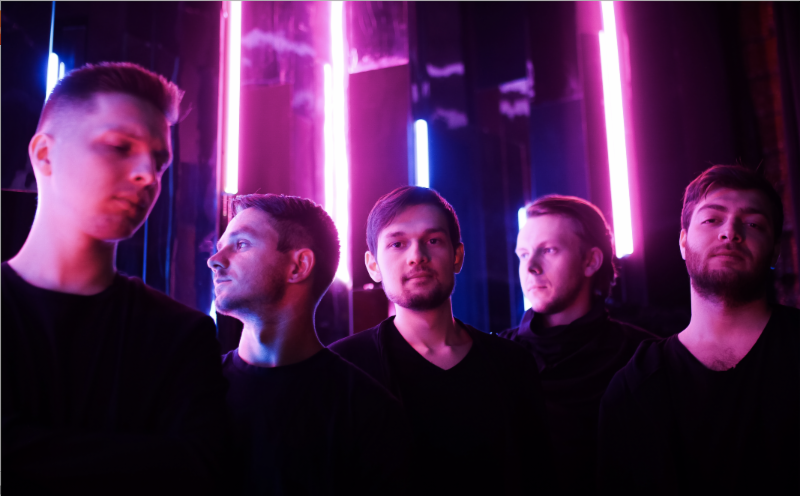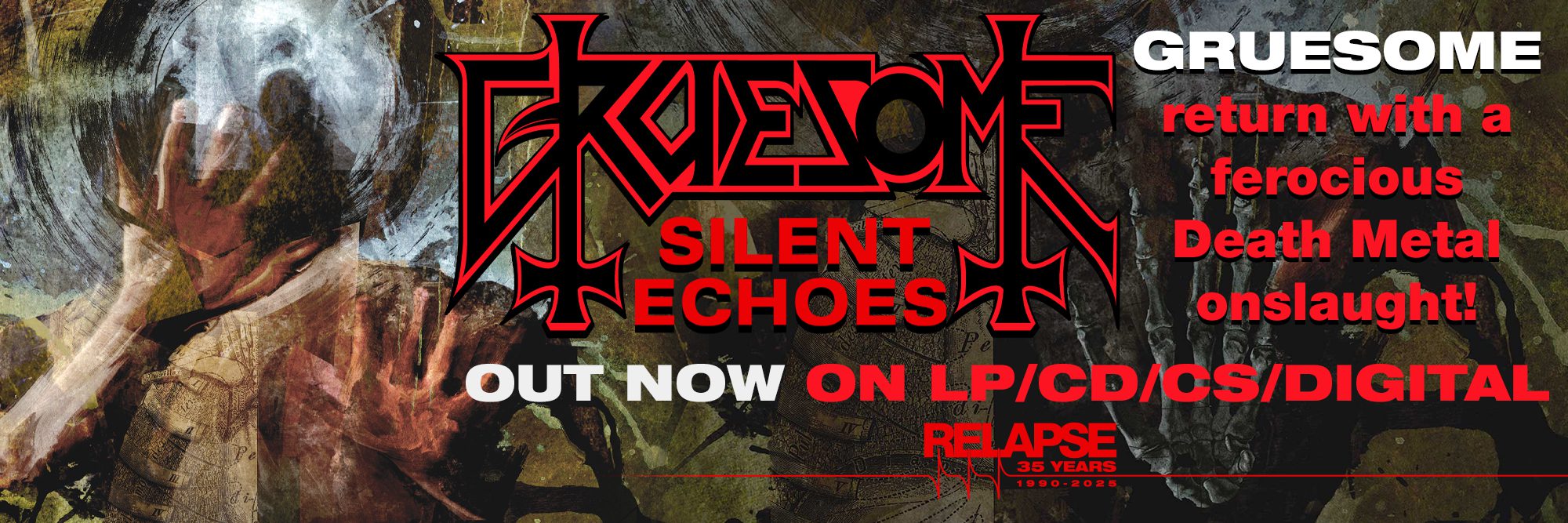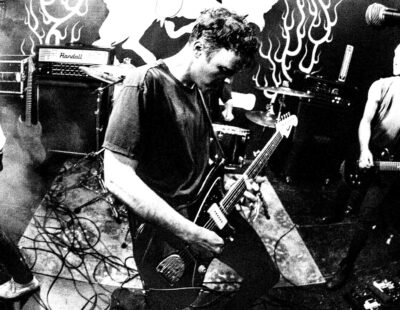
Hailing from Mother Russia, Aesthesys play melancholic post-rock with enough ties to prog and the heavier side of the musical coin to make their forthcoming, second full-length, Achromata, worthy of mention in this space. With musical compatriots and sonic cohorts being Mono, And So I Watch You From Afar, Explosions in the Sky, Russian Circles, GY!BE, Caspain and the like, the quintet is a welcome addition to the world of grandiose and magnanimous, yet emotionally dark, post-rock. The slant that Aesthesys offers up comes with the leaning towards lush orchestration based in classical music and instrumentation (its lineup includes two keyboard players and a violinist). As well, the band has managed to tour their home country, Europe, the U.S, and China all without the help or backing of a label.
Today, we present a track called “Melanocardia” taken from Achromata and an interview that (probably didn’t) gather the band around some vodka, borscht, KHL trading cards and questions designed to introduce them to our readership. As these things usually go, the conversation quickly turned towards the discussion of Swahili, Chinese spices and triangular banjos.
Since it’s your first time here, tell us a bit about the history of the band.
Nik Koniwzski (violin): It all started with one teenage boy who couldn’t help himself but compose stuff.
Sasha Coudray (bass): Yeah, I bet this might make a fine comic book with a following creation of a cinematic universe. We want Tommy Wiseau to direct it.
Nik: “Hahaha, what a story, Mark”. Well, to put it short, Aesthesys exists for ten years now, and for almost a half of that time it was a bedroom solo project of mine. So it was quite an evolution, as the relatively short band period is extremely saturated with tours abroad and other shenanigans we are usually up to.
Victor Krabovich (guitar): I’d say that for the last five years we were getting to this exact point when we have a kick-ass long player. It took years to conceive and polish, so we think it’s that part of the story where every plotline comes together, as the main arc reaches its culmination. But that’s only the first movie. Bring on the franchise, we say!
Was your sound something that was decided upon when you formed, or something that developed naturally into how things are now?
Nik: That was not a conscious decision, more like a coincidence. I’d say that different genres are somewhat like dialects and you happen to be fluent in each of those only if you practice enough. When I started this thing a decade ago, the music that I recorded at first was something I liked as a listener. It was like a mother tongue to me as a composer. And what we’ve got now is a product of a fusion.
Victor: The process of being in a band where the creative aspirations are shared is like being put in a room with strangers who speak slightly different languages than you. So it takes time to adapt and then to work hard on a lingua franca.
Sasha: So now we all speak our musical equivalent of Swahili.
Nik: Hujambo!
If someone held a slingshot to your head and demanded you describe your band, what would you say?
Victor: An instrumental progressive rock band with neoclassic and math-rock influences.
Sasha: The sexiest instrumental band on the planet.
Nik: Red Army Post-Rock Ensemble.
Sasha: The OST of your life.
Victor: Actually yeah, we even had a fan approaching us at dunk! festival in Belgium who told us that his wife gave birth to their child with our music playing during the process, and another fan asked for the track “Dreams Are Only Real As Long As They Last” to be played at her funeral, so it’s the whole circle of life we’re talking here.
Sasha: So you can always find a track of ours fitting every situation imaginable. Even if you have a slingshot held to your head as well.
How much of a formal background in classical and orchestral music do various band members have?
Sasha: In a music school I learnt balalaika. That’s the most Russian instrument ever.
Victor: Like a triangular-shaped banjo with tremolo-based technique.
Sasha: Illuminati confirmed.
Nik: I learnt violin, obviously. Had some string-ensemble experience back a lifetime ago, but that’s it.
Sasha: Eldar, our guitarist, has finished a music school as a guitarist, while Artem the drummer has been playing for decades now.
Victor: Basically, together we’ve got over a hundred years of experience in music already, and we plan to make it two centuries at very least.
Who would you say are Aesthesys crowd? Do you find your band has as many fans from the rock and metal world as it does classical music?
Victor: I guess being an instrumental band has its upsides, especially if the sonic and emotional range is rich enough to attract different people with different preferences. For example, on Achromata we’ve got a cocktail of progressive rock with some bits of electronics, mod-classical music, post-metal, math-rock and hell knows what else.
Sasha: It’s fair to say that we don’t aim to produce a specific mixture, we just try to make the music we all like. And I guess it’s what makes all the difference for a listener. Something authentic and honest does not fit into specified niches, so I’d say that our listener is someone who’s passionate about music in general.
Nik: We target people with ears (evil laughter).

What can you tell us about the short story that accompanies the new album? Was the music written before the story or vice versa? How difficult was it for an instrumental band trying to write with a literary piece in mind?
Nik: The conceptualization has been a weak spot of ours before, so this time we wanted to make the best we could in this field.
Sasha: Nik used to come up with stuff like titles, structure and a unifying idea for a release after the music was already recorded, and it took him around a couple of days at most.
Victor: But this time we had years.
Nik: Yeah, a lot of homework had to be done, so I studied a lot of stuff, most crucially the monomyth structure as described by Joseph Campbell. So before we entered the studio, I already had a framework in mind to build a story for this album, while the earliest sketches for the plot I drafted months in advance. Thankfully, my good friend Richie Sauls from South Africa helped me get it written properly, as my English is not good enough to write a piece of literature one might actually enjoy.
How else would you say that Achromata is different than your previous recordings? What were you striving for with the album? Do you think you’ve found what you were looking for?
Victor: Achromata makes our previous works seem like lullabies. As for the rationale behind it, to put it simple, it has been a while since we had a proper release, so we needed to produce something. And it had better be good.
Sasha: Setting high goals is imperative if you want to grow as a professional. Before that we were good at melodic and somewhat meditative stuff, but now we’ve tamed more high-energy sound and I think that we’ll continue experimenting further on.
Nik: Music is the most important thing in my life, so when you do something you care about that much, you want to make sure you’re doing your absolute best. Previous works at best I’d label as good, though I cannot be objective here. Achromata has a chance to prove itself exceptional. This album is a manifestation of what we can do right now, but we are certainly going to up the ante.
Tell us about the touring you’ve done, specifically about touring in China? How does it compare to other parts of the world you’ve been to?
Victor: So far we’ve performed in both Western and Eastern Europe and China. I guess that EU audience is relatively similar to the one in North America as we all share a certain cultural familiarity, therefore there’s nothing really alien for a Russian band when touring in the West. China is another world, where even the Western trends have quite a specific way of reflecting in the local culture.
Sasha: And the Chinese audience reacts in a different way whatsoever. People in Europe sometimes seem rather worldly-wise and it’s almost impossible to surprise them. They’ve seen it all. Chinese fans also have seen a lot, but they still have this special enthusiasm about everything that happens on stage.
Nik: The food is really spicy. The Chinese kind of spicy is the spiciest of ‘em all. But seriously, Sasha raises a fair point. When you see how much joy the audience is having, it does inspire you to do even more. So that makes China a special place we certainly want to visit again.
Sasha: Though in a sense of touring geography, we are big expansionists. Like, right now we’re thinking about coming to Mexico, while also researching in details what would it take for us to come to the US. Let’s see how fast we’ll make it there.
What is touring in Russia like these days? How much of the country have you been able to get to? Is there much of a market for live music in the eastern part of the country?
Victor: In Russia we’ve played just in five cities, basically. Moscow and Saint Petersburg, the biggest ones in the European half of the country, is where we play the most, since we live in the former and it’s just three hours by train to the latter. In terms of the most distant places of our Motherland, we were able to play in Vladivostok on our way back from China, since it was right nearby.
Sasha: Just to compare, in China alone we had gigs in seven different cities. It would’ve been eight cities if not for the bloody typhoon we got hit by while we were there.
Nik: Logistics is everything when touring and it makes most of our country a hard place to reach without spending a lot of money. Considering the lack of a unified instrumental scene, it’s a free-for-all Darwinian system, some bands do take risks and drive from St. Pete to Urals at most and back, others do keep it relatively local.
Sasha: Our own unique situation allows us to tour abroad without properly touring in our own country, where we remain relatively unknown. While if you ask most of post-rock listeners across the world, they might place Aesthesys among the top bands from ex-USSR, so that’s an irony.
Victor: I’d say that basically we have three huge geographical areas when it comes to touring. The first one is the European part we live in, the second is the Far East with its vibrant market, as Vladivostok hosts some nice international festivals with bands coming from all over the world, and then there’s Siberia which remains somewhat secluded.
Nik: Bands from that region rarely make it elsewhere, and middle echelon bands from other places don’t visit Siberia, so it’s both a bad and a good thing. Bad — because the local bands don’t get the exposure they deserve. Good — ‘cause they’ve got their own thing going own, and that sometimes creates the local flavor, which can be culturally beneficial.
I understand making in-roads in North America is a priority with this record. What else are you hoping that Achromata will achieve for the band?
Victor: Nowadays, if you don’t produce content frequently enough, you’re technically dead as an artist. Though social media kinda helps to exist in such limbo between releases.
Nik: Having an album out is both a shining crescendo and the ultimate examination. We get to share something we care for the most with the world, and see if it’s good enough for today’s culture and audience. Not that we’re so trend-aware and want to produce a specifically 2018 record, but things changes all the time, and a freshly released album is a way of checking if we’re keeping the pace required to evolve as modern artists.
Sasha: I’d say that the intention was to produce a high quality work that would allow us to claim a seat at the instrumental music big boys table alongside And So I Watch You From Afar, Russian Circles, Mono and other great bands. And only the listener can tell us whether we succeeded or not.
Thanks!
Victor: Thank you for having us and keep being awesome!
Sasha: Get ready to mumble!
Nik: And do not forget to floss!
Achromata will be self-released April 3rd. The vinyl version will be released via Narshardaa Records.







